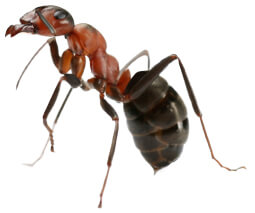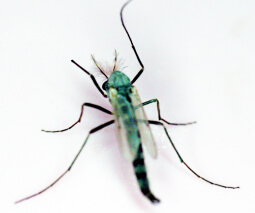AVOIDING SUMMER PESTS IN CANADA
Warm weather and the long-awaited start of summer gives any Canadian a reason to celebrate. But the hot and humid summer weather also creates an ideal paradise for annoying pests. Following a few simple prevention-based tips can keep common pests out of your summer fun.
ANTS
Widely recognized one of the most persistent pests, ants are likely to invade homes across Canada this summer. It seems like they are everywhere and always searching for food.
Once they locate food, ants quickly cooperate and lay down a pheromone (invisible chemical) trail that alerts hundreds of other ants to the food source. This is why you see constant streams of ants following each other under your garbage can, across a cabinet, or through your kitchen.
Here are some tips on how to avoid an ant infestation:
- Locate entry points – gaps under doors, holes in walls, even the smallest cracks – and seal them with caulk or plug with petroleum jelly.
- Keep your kitchen clean. Store foods like cereal, sweets, cookies, flour, sugar, and other dry ingredients in tightly sealed containers. Remember that the smallest crumbs can attract the smallest pests.
- Seal all plumbing or roof leaks and check crawl spaces and attics for excess moisture.
- Don’t leave pet food out overnight.
- Trim tree branches and shrubbery to keep ants from using the landscaping as a direct bridge into your home.
- When landscaping, use the minimum amount of mulch required. Excessive mulch and vegetative ground covers contains the moisture ants need to thrive.
- Store firewood at least 20 feet away from the house and five inches off the ground.
- Remove any dead wood or scraps from around the exterior foundation.
MOSQUITOES
Mosquitoes can be a real annoyance during the summer. In addition to being bothersome, these pests can also cause health and safety concerns. Mosquitoes are infamous for  transmitting diseases like West Nile Virus and other illnesses that cause encephalitis (swelling of the brain).
transmitting diseases like West Nile Virus and other illnesses that cause encephalitis (swelling of the brain).
In Canada, mosquitoes are less likely to spread disease than in the tropics, but the irritation caused by the common red, itchy mosquito bites can still be a pain. Commonly found near water, mosquitoes are usually more active at sunset and at night or in dense shade. Eliminating breeding grounds and following these tips can keep you safe from mosquitoes:
- Get rid of all sources of standing water. Mosquitoes need only about 13 mm (½ inch) of still water to lay their eggs, which can grow from larvae to adult in less than 10 days!
- Regularly empty standing water in flower pots, saucers, barrels, old tires, kiddie pools, buckets, birdbaths, etc. particularly after any rain.
- Drain or use soil to fill in low areas in lawns and landscaped areas where rainwater accumulates.
- Clean out and repair any damaged rain gutters to prevent water from collecting.
- Fix leaky pipes, sinks, appliances, and bathroom fixtures.
- Keep mosquitoes out of your home with tight-fitting screens on windows and doors.
- Invest in your personal protection. Wear long-sleeved shirts, long pants, and socks outdoors. Use a repellent on exposed skin and on thin clothing, since mosquitoes can bite through it.
- Mosquitoes are weak fliers so positioning an oscillating fan in an outdoor area may keep them away.
- Be particularly cautious around dusk and dawn when mosquitoes are most active.
FLIES
Flies can be a nuisance when buzzing around your home. Most fly species also pose a serious health threat by transmitting a wide range of diseases. The best way to ward off flies is through simple cleanliness and taking other preventive steps.
House fly (Musca domestica)
House flies feed on garbage, animal excrement, and all varieties of rotting nastiness. They are known carriers of more than 100 diseases – including cholera, dysentery, and  salmonella – which can cause serious illnesses in humans and animals.
salmonella – which can cause serious illnesses in humans and animals.
In order to eat, the housefly will repeatedly eject its own saliva onto whatever it has landed on and then suck up the resulting mixture. As you can imagine, this is an extremely unsanitary process. Cleanliness is critical to controlling these pests. Houseflies do not bite.
Biting Flies: Horse Fly, Deer Fly, and Black Fly
Most active during the summer, biting flies attack the exposed skin of humans and animals to feed on their blood as a food source. There are many species of biting flies in Canada, each with its own characteristics.
Horse flies are equipped with scissor-like jaws to tear flesh and deliver one of the fiercest bites of any fly species. Their large size and intensity make horse fly bites one of the most painful. Horse flies are attracted to dark objects and prefer moist areas like near lakes shores and at beaches. Deer flies are very similar in appearance to horse flies, although they are slightly smaller.
Black flies are most active during the day and around sunset. Thankfully they do not live indoors. Black flies seek moist environments and are often found near moving water. Hikers often tightly tuck in their shirts and pants to avoid being bothered by black flies. Tips for minimizing fly activity around your home:
- Keep garbage cans clean and securely closed.
- Keep all kitchen surfaces clean including the sink and drain.
- Wash dishes right after a meal, take out the trash, and mop up any spills right away.
- Don’t let food-encrusted plates and bowls hang out throughout the house.
- Make sure all food is stored properly and in tightly-sealed containers.
- Screen all windows and doors, ensuring the mesh is small enough to keep flies out. Repair even the smallest rips or tears.
- If possible, head indoors during dawn or dusk when biting flies prefer to feed.
- If you must be outside, wear long sleeves, pants, and insect repellant.
Truly Nolen Canada has 8 locations to serve you in Ontario (Mississauga/ Burlington/ Oakville/ Brampton; Hamilton/ Guelph/ Kitchener/ Waterloo/ Cambridge; Niagara / St. Catharines; Ottawa / Gloucester; Merrickville; Goderich; and Port Elgin) and Nova Scotia (Halifax). Contact us today!